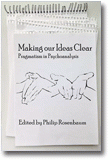
Making Our Ideas Clear
Pragmatism in Psychoanalysis
Edited by:
Philip Rosenbaum, Haverford College
A volume in the series: Advances in Cultural Psychology: Constructing Human Development. Editor(s): Jaan Valsiner, Niels Bohr Professor of Cultural Psychology, Aalborg University.
Published 2015
This book brings pragmatic theory and praxis into dialogue with contemporary psychodynamic ideas, practitioners, and clinical issues. Generally considered as a historical footnote to psychoanalysis, the chapters in this volume demonstrate pragmatism’s continued relevance for contemporary thought. Not only does pragmatism share many of the values and sensibilities of contemporary psychodynamics, its rich philosophical and theoretical emphasis on active meaning making and agentic being in the world complements and extends current thinking about the social nature of self and mind, how we occupy space in the world, non-linear development, and processes of communication.
CONTENTS
Series Editor’s Preface: Connecting Cultural Psychology With Psychoanalysis: How Pragmatism Matters. Introduction: The Effects of the “Postmodern” Turn in Relational Psychoanalysis. Section I: Pragmatic Beginnings: A Historical Overview. Compatibility Between Early Psychoanalysis and Pragmatism, Tania Zittoun. Self as a Sign: Locating Peirce’s Semiotics in Sullivan’s Self-System, Philip J. Rosenbaum. Wilfred Bion: A Piercean Semiotic Reading, Robert White. Commentary: Commentary on Pragmatism and Psychoanalysis, Katharina Rothe. Section II: Applying Pragmatic Theory to Contemporary Questions. Dialogue Between Multiple Self Models: Moving Towards. Integration, Mayer Bellehsen. Achieving Purpose in an Open Cosmos: The Continuing Relevance of William James for Relational and Interpersonal Theory, Jon Weidenbaum. From Meaning to Sensemaking: Implications of a Semiotic and Dynamic Model of Mind for Psychoanalysis, Sergio Salvatore. The American Idea in Siblinghood—Interpersonal Psychoanalysis and Pragmatism: Knowing and the Problem of the Unconscious, Michael Mance. Commentary: Reflections on the Ways Pragmatic Philosophy and Interpersonal Psychoanalysis Are “Related”, Cory K. Chen. Section III: Pragmatic Methodology in Clinical Work. The Psychosemiotic Model for Understanding the Body–Mind Continuum: Implications for Epistemic and Psychotherapeutic Applications, Matti Keinänen. The Dynamics of Control in the Case of Mrs. C: A Pragmatic Study of the Patient/Analyst Dialogue, Georgia Lepper. Children’s Dreams: A Novel Interpretation, Yariv Orgad and Yair Neuman. How Empirical Research Can Help Clinicians Evaluate Psychoanalytic Theory and Practice: A Pragmatic Approach, Jean Knox. Commentary: The Language of Dreams: Dissociative Processes and Symbolic Functioning In Dreaming, Rhona Kaplan. Conclusion: The Pragmatic Maxim and the Good Life, Philip J. Rosenbaum.
-
Paperback9781623968670
Web price: $45.04 (Reg. 52.99)
-
Hardcover9781623968687
Web price: $80.74 (Reg. 94.99)
- eBook9781623968694

- PSY000000 - PSYCHOLOGY: General
- PSY031000 - PSYCHOLOGY: Social Psychology
- PSY030000 - PSYCHOLOGY: Research & Methodology
-
 Culture, Work and Psychology
Invitations to Dialogue
Culture, Work and Psychology
Invitations to Dialogue
-
 Deep Loyalties
Values in Military Lives
Deep Loyalties
Values in Military Lives
-
 Drama of Multilingualism
Literature Review and Liberation
Drama of Multilingualism
Literature Review and Liberation
-
 From Dream to Action
Imagination and (Im)Possible Futures
From Dream to Action
Imagination and (Im)Possible Futures
-
 Home in Transition
The Cultural Construction of Heimat
Home in Transition
The Cultural Construction of Heimat
-
 Making of Distinctions
Towards a Social Science of Inclusive Oppositions
Making of Distinctions
Towards a Social Science of Inclusive Oppositions
-
 Ornamented Lives
Ornamented Lives

